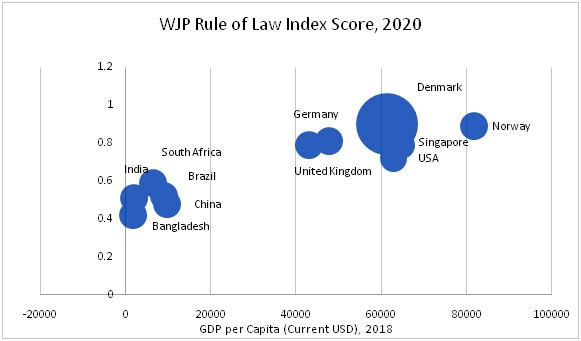Source: WJP Rule of Law Index, 2020, World Bank

Aphune K Kezo
Introduction
For most people, the rule of law is a necessary constraint on abuse of power and nothing more. The original root of the term stems from the French phrase ‘La Principe de Legalite’ (the principle of legality), that is, a government based on the law and not arbitrary use of powers. Today, the meaning has evolved to have many implications. It encapsulates a just system of providing security and order, to the operations of the courts and the administration of justice. Keeping in mind, how this same system protects and preserves the citizens’ individual freedoms, property rights, and performance of contractual obligations on the lines of the classic political economy, its failure can lead to the lack-lustre outcomes in overall productivity.
Law and Development
Many studies have shown that there is an apparent link between maintaining the rule of law and economic progress of a State. The WJP (World Justice Report) Rule of Law Index, 2020 is an annual report that publishes the rankings of countries based on the rule of law on Eight Factors – Constraints on Government Powers, Absence of Corruption, Open Government, Fundamental Rights, Order and Security, Regulatory Enforcement, Civil Justice, and Criminal Justice. It was seen that countries who performed highly on the Rule of Law Index also performed better in the GDP per Capita of their respective countries.
Summarizing the report, 128 countries were ranked with scores ranging between 0 (lowest) to 1 (highest), in which Denmark ranked first with a score of 0.9. Emerging economies like India scored 0.51 ranking 69th position, China scored 0.48 coming at 88th rank and Brazil scoring 0.52 at 67th rank. The disparity between the developing nations and developed nations can also be attributed to their distinctive political economies, from the communist, social welfare oriented to the liberal democratic states. Other studies have shown that semi-authoritarian or semi-democratic regimes – many transitional in nature – show greater economic volatility than either authoritarian or democratic regimes (Haggard, MacIntyre and Tiede, 2008).
According to researchers, the different adverse effects on economic activity through subversion of the law can be seen in the following ways:
1) When the courts cease to be a dependable institution for dispute resolution, parties are forced towards the costly alternative of private enforcement, and investment and trade suffer accordingly;
2) Rent seeking and corruption raise costs for producers and consumers by diverting resources into the rent seeking process; and
3) Most importantly, rent seeking and corruption introduce distortions that constitute barriers to long-term growth: misallocation of government spending and private expropriation of assets through managerial malfeasance.
Legal scholars have associated the rule of law with restraints on the state acting in conformity with established statutes or reforming them through legislative means to that objective, not at the discretion of the whims of the executive. Furthermore, ample empirical evidence suggests the impact of adverse effects of government instability on economic performance (Alesina et al. 1996).
Think Globally, Act Locally
Our job as citizens is to be aware of the lawfulness or lawlessness of the activities of formal institutions that owe their democratic duties to the public at large. Legal awareness brings empowerment, as we have seen many times in the past, where the citizens have challenged the sovereign, even autocrats make institutional, legal, and policy concessions to guard against the threat of being disposed. Some tools that can be used are Right to Information applications, Public Interest Litigations with lawyers’ help, and, something that calls for a higher personal integrity, not conceding to the low standards of public morality. With the entire economic progress at stake due to lack of legal conscience, it is a small step towards a bigger aim.
The writer is an LL.M Candidate, Jindal Global Law School (Sonepat, NCR Delhi). She has also worked in Delhi in areas of Criminal Justice Reforms, Tech Start-Up, and Real Estate.



